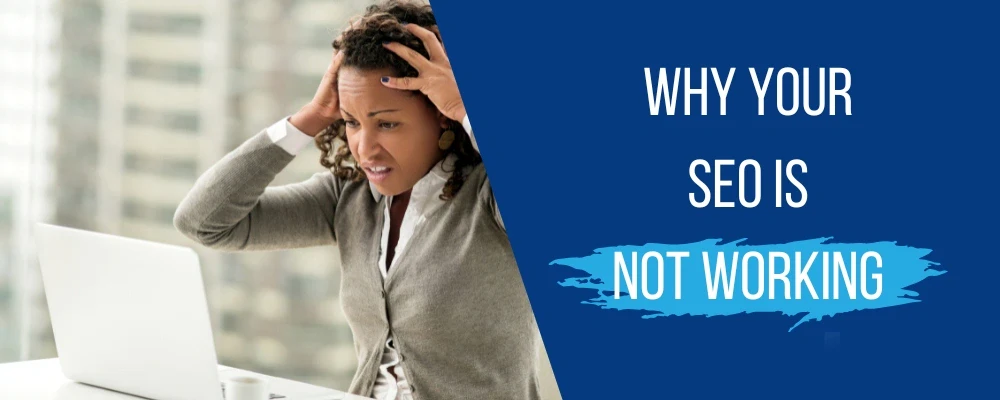Wondering why your SEO is not working? SEO is super important for getting your website noticed, but sometimes, no matter how much effort you put in, you might not see the results you expected. If your SEO strategies are not working, these 10 Factors might be the problem. Many people don’t even realize they’re making mistakes that are hurting their rankings! Let’s dive into 10 key reasons and how you can fix them.

Why are your SEO methods not working?
1. Your Content Doesn’t Match Search Intent
One of the biggest SEO mistakes is creating content that doesn’t align with what people are searching for. Google’s goal is to deliver the best answers to user queries. You’ll struggle to rank if your content isn’t answering those queries effectively.
How to Fix It:
- Before writing content, research your target keywords and see what type of content is currently ranking.
- Identify if the top-ranking pages are informational (guides, how-tos) or transactional (product pages, service listings), and structure your content accordingly.
- Ensure your content fully addresses the topic and provides comprehensive, well-researched answers.
2. Overloading Content with SEO Keywords
Stuffing your content with keywords is a common reason why your SEO is not working as expected. Google can tell when a page is over-optimized and filled with too many keywords, making the content sound unnatural. Instead of stuffing keywords, focus on using them naturally within the content, and mix in synonyms and related terms to make everything read smoothly.
How to Fix It:
- Focus on writing for people first, not just for search engines.
- Use synonyms and related keywords naturally.
- Aim for a keyword density of around 2% and make sure your primary keyword, “SEO not working,” appears in strategic places.
- Use long-tail keywords to capture different variations of search intent.
3. Why your SEO is not working? Your website may not be mobile-friendly
Did you know that more than 60% of Google searches now come from mobile devices? If your site isn’t optimized for mobile users, your SEO will not work. More people browse the internet on their phones than ever before. A slow, hard-to-navigate website will push visitors away and hurt your search rankings.
Read more: Why are mobile Friendly websites so important?
How to Fix It:
- Use Google’s Mobile-Friendly Test to see how your site performs on mobile devices.
- Optimize your site for mobile by using a responsive design that adapts to different screen sizes.
- Make sure your pages load quickly by compressing images and removing unnecessary elements.
4. You’re Ignoring Technical SEO
Technical SEO is crucial for helping search engines understand and properly index your website. Even if your content is top-notch, your SEO strategy may be faulty if technical SEO is ignored.
Common technical SEO mistakes:
- Slow site speed: More than 40% of users leave a website if it takes longer than three seconds to load.
- Broken links: Google doesn’t like broken pages, and neither do your visitors.
- Lack of HTTPS: If your site isn’t secure, Google may lower your rankings.
- Missing structured data: Using schema markup helps search engines understand your content and display rich results.
- Improper URL structure: Keep URLs short, and readable, and include your keyword when possible.
The Most Overlooked Reasons for Why Your SEO Strategies and Methods Are Not Working
5. You’re Not Getting Enough Quality Backlinks
High-quality backlinks from reputable sites help search engines see your site as trustworthy. Instead of buying backlinks (which Google penalizes), focus on creating valuable content that people want to share naturally.
- Get backlinks from high-authority websites in your industry.
- Guest post on well-known blogs or contribute expert quotes for relevant articles.
- Avoid spammy backlinks from irrelevant sites, as they can harm your SEO.
6. Poorly Optimized Title Tags & Meta Descriptions
Title tags and meta descriptions help search engines and users understand what your page is about. Weak or missing title tags and meta descriptions might lead to SEO failure.
- Write unique, compelling titles for each page, incorporating your keywords naturally.
- Keep title tags under 60 characters and meta descriptions under 160 characters.
- Avoid duplicate titles and descriptions across different pages.
7. Lack of Fresh, High-Quality Content
Search engines want unique, valuable information, and thin, low-quality, or duplicate content won’t rank well. To improve your rankings:
- Update outdated blog posts with new data, examples, and insights.
- Write long-form content that answers user questions in depth.
- Use original research, statistics, and expert insights to boost credibility.
8. Using Improper Internal Links will lead to SEO not working
Internal links help search engines understand your site’s structure and guide users through your content. Make sure you are linking your pages strategically.
- Ensure all pages have internal links to relevant content.
- Use descriptive anchor text rather than generic words like “click here.”
- Avoid having orphan pages (pages with no internal links pointing to them).
9. Ignoring Local SEO Can Be Why Your SEO is Not Working
If you have a local business, but your SEO is failing, you might not be focusing enough on local SEO. Not showing up in local searches means missing out on potential customers in your area.
To fix this, ensure your Google Business Profile is fully set up, include location-based keywords, and get reviews from local customers to improve your visibility.
10. No Backlink Strategy Means Your SEO Will Not Be Working
Backlinks are still one of Google’s top-ranking factors. If your search marketing is not working, it could be because you’re not actively building high-quality backlinks.
- Build relationships with influencers and bloggers in your niche.
- Focus on creating link-worthy content like industry reports, infographics, and case studies.
- Avoid buying low-quality backlinks, as they can get you penalized by Google.
FAQ (Frequently Asked Questions)
By identifying and fixing these common SEO mistakes, you’ll be on the right track to improving your rankings and getting the traffic your site deserves. Keep testing, tweaking, and learning to stay ahead in the ever-changing world of SEO!


